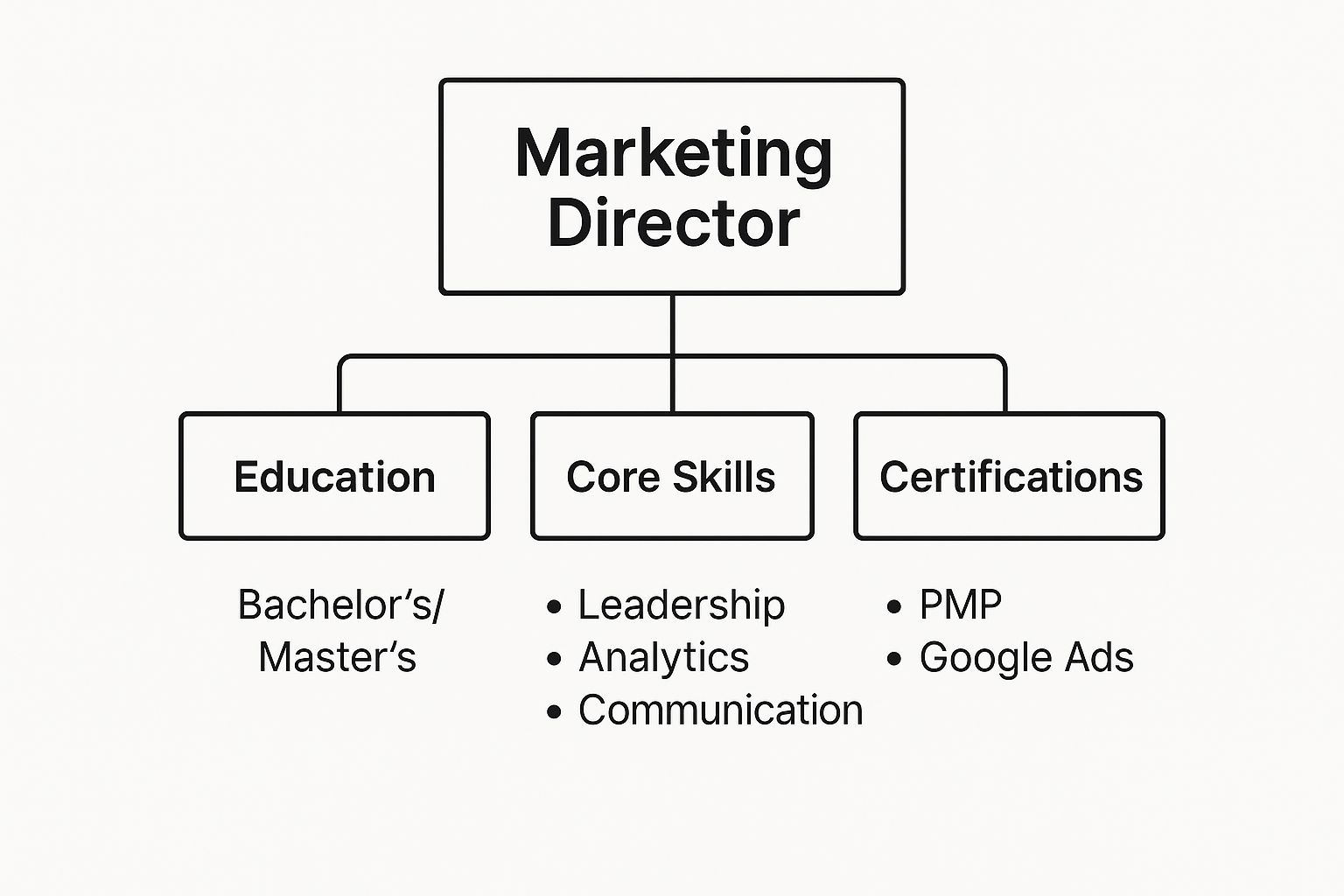A well-crafted marketing director job description does more than just list duties. It captures the essence of a strategic leader who steers the company’s entire marketing vision, commands the team, and owns the budget. This individual is the architect of the brand's growth, skilfully blending creative strategy with sharp, data-driven decisions to achieve crucial business targets.
Forget simple campaign management; this role is at the very heart of generating revenue and carving out a strong market position.
What Does a Modern Marketing Director Really Do?

Think of the modern Marketing Director as the chief architect of a company’s growth engine. If a Marketing Manager is on the ground executing the plan, the Director is the one who designed the blueprint in the first place. Their job is to ensure every single marketing activity, from a social media post to a major product launch, aligns perfectly with the company's broader objectives. They are the visionary force shaping brand reputation, bringing in new customers, and ultimately, driving profitable growth.
The role has changed dramatically. A decade ago, a director might have spent most of their time on traditional advertising and PR. Today’s leader has to be a much more sophisticated operator, fluent in both the art of compelling storytelling and the hard science of data analytics. They are the one who connects the dots between a clever campaign and the numbers on the bottom line.
Beyond a Checklist of Duties
The real impact of a Marketing Director goes far beyond a simple task list. Their work is strategic and interconnected, all focused on building a sustainable competitive edge. This includes:
- Brand Stewardship: They are the ultimate guardian of the brand's narrative. It is their job to ensure a consistent and powerful message is felt at every single customer touchpoint.
- Revenue Accountability: Marketing is no longer just a cost centre. The Director is directly responsible for generating a measurable return on investment (ROI) and feeding qualified leads into the sales pipeline.
- Market Leadership: They are always looking ahead, tasked with spotting new market opportunities, getting ahead of consumer trends, and positioning the company as an industry leader.
A great Marketing Director doesn't just manage marketing; they shape how the market perceives the entire organisation. They build the brand’s reputation, drive demand, and secure its future in a competitive landscape.
For hiring managers, getting this definition right is the first, most critical step in attracting top-tier talent. For candidates aspiring to the role, understanding its strategic depth is the key to success. This guide will unpack the core responsibilities, skills, and metrics that truly define this pivotal position, helping you build a marketing director job description that speaks to genuine business leaders.
Defining Core Responsibilities and Strategic Impact

If you want to write a job description that lands you a great Marketing Director, you need to think beyond a simple task list. The real value of this role isn't just what they do, but how their responsibilities connect to drive the entire business forward. Think of it as a puzzle: each function directly fuels massive goals like growing market share, boosting revenue, and building a loyal customer base.
Grasping this is the secret to attracting candidates who are genuine business leaders, not just department managers. None of these responsibilities exists in a vacuum. A brilliant strategy is just a document without a motivated team to bring it to life, and that team cannot do much without a smartly managed budget. The director is the conductor of this orchestra, ensuring every instrument plays in harmony to achieve the company's vision.
Strategic Marketing and Visionary Planning
At their core, a Marketing Director is the company’s strategic architect. Their main job is to develop the high-level marketing plan that guides every single campaign and activity. This goes far beyond just choosing social media channels; it’s about having a deep, almost intuitive understanding of the market, knowing exactly what the target audience needs, and positioning the company to outmanoeuvre the competition.
A top-tier director’s plan will always have clear, measurable goals tied directly to the bottom line. But that vision cannot be set in stone. The director is constantly scanning for market trends and digging into campaign data, ready to pivot or double down on what’s working. They are the ones answering the big questions: "Where should we be competing?" and "How are we going to win there?"
Team Leadership and Mentorship
You can almost always judge a Marketing Director's performance by the success of their team. They are responsible for building, mentoring, and leading a high-performing marketing department from the ground up. This is so much more than just handing out tasks; it's about nurturing a culture where creativity, accountability, and a desire to constantly improve are the norm.
Effective leadership here really boils down to a few key things:
- Setting Clear Direction: Making sure every single person on the team knows what their role is and, more importantly, how their work contributes to the bigger picture.
- Fostering Talent: Spotting individual strengths and actively creating opportunities for people to grow and develop their careers.
- Inspiring Action: Motivating the team to pursue ambitious goals and tackle challenges with a collaborative, can-do spirit.
Shrewd Budget Management and ROI
The Marketing Director holds the purse strings. They are the custodian of the marketing budget and are expected to allocate funds with surgical precision, ensuring every pound spent delivers the maximum possible return on investment (ROI). This demands a rock-solid grasp of financial principles and the ability to build a bulletproof business case for every marketing pound spent.
The ability to translate marketing metrics into financial impact is non-negotiable. A director must confidently report on key figures like Customer Acquisition Cost (CAC) and Customer Lifetime Value (CLV) to the executive team.
This financial accountability is what separates a good director from a great one. It elevates the role from a purely creative function to a core driver of the business. It’s all about proving marketing's value in the language the rest of the C-suite understands: pounds and pence. To attract someone with this mindset, you need to know how to create job ads that attract the right candidates by framing these responsibilities in a way that speaks to true business leaders.
What Makes a Great Marketing Director? It's All in the Skills.
A Marketing Director's job is a substantial one. But what truly separates the good from the great is a unique mix of talents. The best candidates have a powerful combination of technical intelligence and people skills, allowing them to devise brilliant strategies and inspire their team to bring them to life.
When you're writing a job description to attract a real visionary, you need to understand this blend. It’s the difference between finding someone who just manages tasks and someone who truly leads.
This infographic breaks down what that looks like in practice, from education to the must-have skills that build the foundation of a top-tier marketing leader.

As you can see, success in this role starts with a solid educational base. But it's layered with core competencies and specialised certifications that show they're committed to staying ahead of the curve.
Hard Skills vs Soft Skills for a Marketing Director
To truly understand what you're looking for, it helps to split the skills into two camps: the 'hard' technical skills and the 'soft' people skills. A great Marketing Director is fluent in both languages, using data to build the strategy and leadership to execute it. One without the other simply does not work.
The table below breaks down this crucial distinction.
| Skill Category | Specific Skill | Why It's Critical for the Role |
|---|---|---|
| Hard Skill | Data Analysis & Reporting | To turn raw numbers (like website traffic or conversion rates) into a clear story about what's working and what's not. Essential for proving ROI. |
| Soft Skill | Visionary Leadership | To inspire and motivate a team, uniting them behind a common goal. It’s about creating a "why" that people can rally behind. |
| Hard Skill | SEO/SEM Strategy | To understand how to win on Google. This isn't about doing the day-to-day keyword research, but setting the overarching strategy for organic and paid search. |
| Soft Skill | Communication & Influence | To get buy-in from the CEO, collaborate with the sales team, and clearly articulate the marketing vision to everyone in the company. |
| Hard Skill | Marketing Automation & CRM | To know the tools of the trade (like HubSpot or Salesforce) inside-out, using them to create efficient, scalable marketing systems. |
| Soft Skill | Adaptability & Problem-Solving | To navigate unexpected market shifts, campaign failures, or budget cuts with a cool head, finding creative solutions to keep moving forward. |
| Hard Skill | Budgeting & Financial Acumen | To manage a significant budget effectively, allocating funds to the right channels to get the best possible return on investment. |
Ultimately, hard skills get you in the game, but soft skills are what let you win. A director who cannot lead a team or persuade a stakeholder is just a strategist on paper.
The Technical Toolkit: Essential Hard Skills
Hard skills are the concrete, measurable abilities a director needs to analyse what is happening in the market and manage campaigns effectively. They form the analytical backbone of any marketing strategy, ensuring every decision is backed by data, not just a gut feeling.
In a world where marketing success is measured in numbers, these skills are non-negotiable. Your director absolutely must be fluent in the tools and techniques that power modern marketing.
Here are the key hard skills to look for:
- Data Analysis and Reporting: They need to be comfortable diving into complex data, making sense of performance metrics, and turning those numbers into actionable insights. A great director can talk confidently about KPIs like Marketing ROI and Customer Acquisition Cost (CAC).
- SEO and SEM Strategy: This is about a deep, strategic understanding of search engine optimisation and marketing. We're not talking about hands-on keyword research, but about setting the high-level vision to dominate search results for both organic and paid traffic.
- Marketing Automation and CRM: Proficiency with major platforms is a must. A director should know how to leverage these tools to build efficient workflows, nurture leads, and deliver personalised customer experiences at scale.
- Budgeting and Financial Acumen: A strong grasp of financial planning is critical. This means they can allocate the marketing budget intelligently across different channels to squeeze out the maximum return and confidently justify that spending to the executive team.
A top-tier Marketing Director uses data not just to report on what has happened, but to predict what will happen next. They turn analytics into a strategic advantage, guiding the company toward untapped market opportunities with confidence.
The Human Element: Crucial Soft Skills
While hard skills answer the "what," soft skills are all about the "how." These are the interpersonal qualities that allow a director to lead a team, influence stakeholders, and navigate the often-tricky dynamics of an organisation.
Honestly, they're often the deciding factor that separates an average manager from an inspirational leader. You won't find these on a certificate, but you'll spot them immediately in how a candidate talks about their vision and experiences.
A director has to be more than just a manager; they need to be a leader who can rally the entire team around a shared goal. This takes exceptional communication skills—the ability to break down complex strategies into a clear, compelling story that inspires people to act and gets buy-in from the C-suite.
This is also where influence comes into play. A great director builds strong bridges across departments, ensuring marketing is perfectly aligned with sales, product, and finance for a truly cohesive go-to-market strategy. It’s worth exploring the key qualities and top skills to look for in a digital marketing professional, as these fundamental traits are simply magnified at the director level.
Building Your Ideal Candidate Profile
When you're writing a job description for a Marketing Director, it's easy to fall into the trap of just listing requirements. Instead, think of it as painting a picture of your ideal strategic partner. Yes, qualifications are important, but the true markers of a brilliant candidate are found in their professional journey and a clear history of achieving results.
You're not just hiring for a senior title; you're searching for a leader who has a proven knack for driving real, measurable growth.
A degree in Marketing, Business, or a similar field is a great foundation, but do not let it be the only thing you look for. Some of the most innovative marketing leaders have come from completely different academic backgrounds, bringing fresh eyes and unique perspectives to the role. The real gold is in their track record.
From Experience to Expertise
There is a significant leap from being a manager to becoming a director. It’s the difference between executing tasks and owning the entire strategic outcome. This is a critical distinction to keep in mind as you assess potential candidates.
Look for a career path that shows steady growth and increasing responsibility over 8-10+ years. A CV should tell a story. You want to see someone who has moved from running individual campaigns to leading entire teams and shaping the direction of a whole department. This is not just about time served; it's about evolving as a strategic thinker.
Beyond Years on the Job
Experience is one thing, but results are everything. A decade in a role means very little if there are no concrete achievements to show for it. Your job description needs to actively encourage candidates to showcase their impact.
A truly great Marketing Director can connect their past actions to clear business results. They do not just talk about the campaigns they ran; they talk about the revenue they generated, the market share they captured, and the teams they built.
To find this kind of talent, you need to ask for specific examples of their wins. This could include things like:
- Successful Campaign Outcomes: Ask for the story of a campaign they led from start to finish. What were the goals? What was the strategy? And most importantly, what were the measurable results, such as lead generation or a direct lift in sales?
- Team Growth and Mentorship: How have they developed people? Seeing evidence of team members they have promoted or a department they have expanded is a massive sign of a true leader.
- Budgetary Impact: Delve into their experience managing significant marketing budgets. You want to know how they decided where to invest money to get the best possible return.
Focusing on these kinds of achievements helps you attract candidates who are genuine, results-driven leaders. In fact, understanding how to attract and retain top marketing professionals starts right here, by defining a role that values proven impact far more than just time served.
How to Set Clear Performance Metrics and KPIs
A job description for a Marketing Director that just lists responsibilities is missing the point. To attract a true leader, you need to define what success actually looks like from their very first day. Vague goals like “increase brand awareness” simply will not cut it for a results-driven professional.
Instead, you should build specific, measurable Key Performance Indicators (KPIs) right into the role’s expectations. This immediately shows top candidates that your organisation is data-savvy and gives them a clear picture of what they will be accountable for. It turns the job advertisement from a simple wish list into a strategic roadmap.
Think of it as showing them the finish line before the race even starts. They will know exactly where they need to go and how their performance will be measured.
From Vague Goals to Measurable Outcomes
To land a strategic leader, you have to move past generic duties and spell out the exact business outcomes they are expected to deliver. This means connecting marketing activities directly to the company's bottom line and overarching goals.
When you do this, you are not just hiring a marketer. You are bringing on a business leader who knows how to convert marketing spend into profitable growth. The right person will see the challenge of owning these numbers as an exciting opportunity, not a burden.
A top-tier Marketing Director doesn't just want a budget; they want to be judged on the return that budget generates. Defining clear KPIs shows that you trust them to deliver measurable value and that you speak the same language as the rest of the executive team.
Core KPIs for a Marketing Director Role
When you are writing the job description, focus on the high-level metrics that show real business impact. These are the numbers that the C-suite cares about and that prove marketing’s contribution to the company's financial health.
Here are four essential KPIs to consider including:
Marketing ROI (Return on Investment): This is the ultimate test of efficiency. It answers the most important question: "For every pound we spend on marketing, how many pounds do we get back?" A key part of setting clear performance metrics is understanding how to demonstrate tangible results. For instance, delve deeper into measuring marketing ROI effectively to justify budgets and showcase strategic value.
Customer Acquisition Cost (CAC): This metric tells you the total cost of all your sales and marketing efforts to bring in one new customer. A successful director will be tasked with finding ways to consistently reduce this number over time, proving they can acquire customers more efficiently.
Customer Lifetime Value (CLV): This KPI is all about the long game. It estimates the total revenue you can expect from a single customer over their entire relationship with your business. Great marketing does not just stop after the first purchase; a director focused on increasing CLV will build strategies that encourage loyalty and repeat business.
Brand Equity Growth: This one can feel a bit less tangible, but it’s just as important. You can track it through measures like your share of voice in the market, brand recall surveys, and your Net Promoter Score (NPS). It shows the director's ability to build a strong, respected brand that stands out.
By weaving these kinds of metrics into your marketing director job description, you send a powerful signal to ambitious, data-driven candidates. It tells them your company is serious about growth and ready to reward the people who can make it happen.
Marketing Director Salary Expectations in Australia

If you want to attract a true strategic leader, the conversation inevitably turns to compensation. And rightly so. A Marketing Director's salary in Australia is a direct reflection of the immense value and seniority that comes with the job.
But it is not a one-size-fits-all figure. The final number can swing quite dramatically based on a few key factors. Getting a handle on this from the outset is vital, whether you're a business putting together a competitive offer or a candidate weighing up your next big career move.
So, what are we actually talking about? Recent market data shows a fairly broad range. A Marketing Director or CMO in Australia can expect a base salary between AUD 200,000 and AUD 350,000 per year. That figure typically includes superannuation but does not account for performance bonuses.
For seasoned leaders steering bigger, more complex teams, or those with a deep well of experience, that compensation can climb as high as AUD 550,000. The latest Ampersand Professional Services Marketing & Business Development Salary Survey offers an excellent deep dive into these numbers.
Key Factors Influencing Salary
That wide salary band is not random; it is shaped by the specific demands and scope of the role. When you're putting together your marketing director job description and deciding on the remuneration, these are the main dials to consider:
- Company Size and Revenue: It’s simple, really. Bigger companies with larger revenue streams and more complex operations generally pay more. The scale of responsibility is just on another level.
- Industry Sector: Money talks differently across industries. A marketing leader in a high-growth technology company might command a different salary to one in professional services or retail, driven by market demand and profit margins.
- Geographic Location: Where you're based matters. Salaries in major hubs like Sydney and Melbourne tend to be higher, reflecting the steeper cost of living and the sheer concentration of corporate headquarters.
Common Questions About the Marketing Director Role
To wrap things up, let's tackle a few of the questions that always seem to arise when companies are hiring for, or people are stepping into, a marketing director role. Getting straight answers here can save a lot of confusion down the track for everyone involved.
Think of these as the practical, on-the-ground queries that help define how the role really works day-to-day.
What is the primary difference between a Marketing Manager and a Marketing Director?
The biggest difference comes down to strategy versus tactics. A Marketing Manager is generally focused on executing specific campaigns and leading a team to hit defined targets. They live in the world of 'how' and 'when'.
A Marketing Director, on the other hand, is the one who sets the entire marketing vision. They control the budget and ensure every single marketing activity ties back to the company's broader business goals. They operate in the world of 'why' and 'what', creating the strategic blueprint for the manager and their team to build from. If you think of it like building a house, the director is the architect, and the manager is the master builder.
How important is industry-specific experience?
This is an excellent question. While the fundamentals of good marketing travel well across industries, specific experience in your sector is a huge advantage. A director who already understands your audience, knows the key competitors, and is familiar with any regulations can hit the ground running much faster. They already speak your customers' language.
That said, if your goal is to shake things up, hiring someone from a completely different industry can be a game-changer. A candidate with a history of innovation might bring a fresh perspective that you'd never find internally. The right choice really depends on whether you are looking to perfect your current approach or build something entirely new.
What should our job ad's 'About Us' section include?
Do not just copy and paste the standard company bio. You need to sell the opportunity. Talk about your mission and your vision, and give candidates a real sense of your workplace culture. Mention a few recent wins, share your ambitious plans for growth, or talk about exciting projects coming up.
Describe the marketing team as it stands today and, crucially, explain how this new director will be empowered to shape its future. Giving this context helps the best candidates see if it's a good cultural fit and imagine the real impact they could make from their very first day.
Finding the right strategic leader to guide your marketing is one of the most important decisions a business can make. At Redwolf Rosch, we specialise in connecting organisations with elite IT and Digital professionals who can drive real growth. If you are looking for a trusted, high-performing recruitment partner, get in touch for an introductory discussion today.
 Submit CV
Submit CV Submit vacancy
Submit vacancy  Call for a Candidate
Call for a Candidate